-
Obama urges Americans not to panic, asks Congress for emergency funding

President Barack Obama has urged the American public not to panic about the Zika virus, and has asked Congress for more than $1.8 billion emergency funding to combat further infections. Speaking in an interview on CBS This Morning, Obama said: “The good news is this is not like Ebola, people don’t die of Zika — a lot of people get it and don’t even know that they have it.”
-
-
Planes arriving from Zika-infected regions to be sprayed with insecticides

The U.K. government announced that planes landing in the United Kingdom from areas affected by the Zika virus will be sprayed with insecticide as part of the government’s response to the outbreak. So far there have been no Zika cases reported in the United Kingdom, but two adults in Ireland were confirmed to have been infected. Both have since fully recovered.
-
-
Florida declares state of emergency in four counties with Zika virus

Florida Governor Rick Scott has declared a state of emergency in four counties where nine residents have been diagnosed with the Zika virus. Miami-Dade in south Florida, Hillsborough in Tampa Bay, Lee County in southwest Florida, and Santa Rosa County in Florida Panhandle have all been affected under the executive order. Health officials believe, however, that the residents became sick outside the United States.
-
-
WHO calls Zika virus “Public Health Emergency of International Concern”
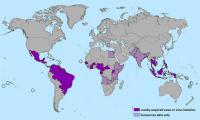
The Emergency Committee of the World Health Organization (WHO), after considering the health threat associated with the continuing spread of Zika virus disease in Latin America and the Caribbean, agreed that the situation meets the conditions for a Public Health Emergency of International Concern. WHO called for a coordinated international response to minimize the threat in affected countries and reduce the risk of further international spread.
-
-
Biodefense Panel concerned as Zika, avian flu expand their reach toward U.S.
The Blue Ribbon Study Panel on Biodefense responded last week with what it described as “serious concerns” over two emerging infectious diseases that now threaten the United States — Zika virus and avian influenza.
-
-
Mosquito species carrying Zika virus found in Washington, D.C.
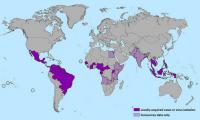
On Monday (25 January), the World Health Organization (WHO) announced that Zika virus, a mosquito-borne illness that in the past year has swept quickly throughout equatorial countries, is expected to spread across the Americas and into the United States. Zika virus is transmitted by the mosquito species Aedes aegypti, also a carrier of dengue fever and chikungunya, two other tropical diseases. Though Aedes aegypti is not native to North America, researchers who study the species have reported a discovery of a population of the mosquitoes in a Capitol Hill neighborhood in Washington, D.C.
-
-
Zika virus spreads in Colombia
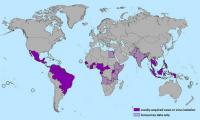
In October 2015, a team of researchers ran the first tests confirming the presence of Zika virus transmission in Colombia. In their study, the researchers document a disease trajectory that started with nine positive patients and has now spread to more than 13,000 infected individuals in the South American country. Colombia is now only second to Brazil in the number of known Zika infections.
-
-
Rise of drug-resistant infections to cost millions of lives, trillions of dollars
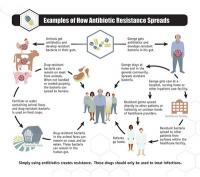
Drug-resistant infections could kill an extra ten million people across the world every year by 2050 if these infections are not tackled. By this date they could also cost the world around $100 trillion in lost output: more than the size of the current world economy, and roughly equivalent to the world losing the output of the U.K. economy every year, for thirty-five years.
-
-
Scientists create malaria-blocking mosquitoes
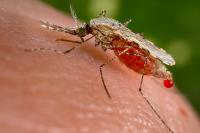
Using a groundbreaking gene editing technique, scientists have created a strain of mosquitoes capable of rapidly introducing malaria-blocking genes into a mosquito population through its progeny, ultimately eliminating the insects’ ability to transmit the disease to humans. The technique holds the promise of eradicating a disease that sickens millions annually.
-
-
Surface Enhanced Raman Scattering (SERS) technology for on-site detection
Surface Enhanced Raman Scattering (SERS) technology currently is applied using chemical analysis of materials, such as scanning at airports to identify what materials may be inside of glass vials. Researchers want to expand SERS for use in biological applications that could employ antibodies for purposes such as identifying viruses, water toxins, or pathogens in food samples. The researchers work on developing a small hand-held device that allows users to take a sample, put it in a glass vial and insert into the instrument for rapid identification.
-
-
DoD awards $7.6 million to Pitt to develop therapies against biowarfare
The U.S. Department of Defense (DOD) has awarded a $7.6 million grant to a collaborative group of scientists in the University of Pittsburgh Center for Vaccine Research (CVR) for work which could lead to countermeasures against bioterrorism attacks. The contract is the latest in a successful run of federal funding for this group of investigators within Pitt’s CVR, which the DOD acknowledges has performed well.
-
-
Oregon teen infected with bubonic plague
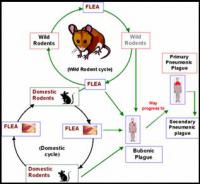
Health authorities in Crook County, Oregon, confirmed that a teenage girl has contracted bubonic plague from a flea while on a hunting trip. The girl became sick five days after the trip started on 16 October; and was rushed to a hospital in Bend, Oregon on 24 October.
-
-
Researchers develop rapid method for water, air, and soil pathogen screening
Researchers have developed a highly sensitive, cost-effective technology for rapid bacterial pathogen screening of air, soil, water, and agricultural produce in as little as twenty-four hours. “Rapid and reliable pathogen detection in field samples is critical for public health, security and environmental monitoring. Current methods used in food, water or clinical applications rely on labor and time-intensive culturing techniques while activities such as dairy farming, wastewater and runoff treatment necessitates real-time monitoring of pathogens in environment samples,” said one of the researchers.
-
-
Long-distance travelers may contribute to the spread of antibiotic resistance
Swedish exchange students who studied in India and in central Africa returned from their sojourns with an increased diversity of antibiotic resistance genes in their gut microbiomes. These resistance genes were not particularly abundant in the students prior to their travels, but the increases are nonetheless quite significant. The researchers questioned the conventional wisdom that overuse of antibiotics was entirely responsible for the surge in resistance, despite the fact that overuse is a huge problem.
-
-
Pfenex awarded contract valued at up to $143.5 million to develop anthrax vaccine

San Diego, California-based Pfenex Inc. the other day announced it has signed a five year, cost plus fixed fee contract valued at up to $143.5 million with the Biomedical Advanced Research and Development Authority (BARDA) of the Department of Health and Human Services (HHS), for the advanced development of Px563L, a mutant recombinant protective antigen anthrax vaccine. The company says the U.S. government is looking to have a stockpile of seventy-five million doses.
-
- All
- Regional
- Water
- Biometrics
- Borders/Immig
- Business
- Cybersecurity
- Detection
- Disasters
- Government
- Infrastructure
- International
- Public health
- Public Safety
- Communication interoperabillity
- Emergency services
- Emergency medical services
- Fire
- First response
- IEDs
- Law Enforcement
- Law Enforcement Technology
- Military technology
- Nonlethal weapons
- Nuclear weapons
- Personal protection equipment
- Police
- Notification /alert systems
- Situational awareness
- Weapons systems
- Sci-Tech
- Sector Reports
- Surveillance
- Transportation
Advertising & Marketing: advertise@newswirepubs.com
Editorial: editor@newswirepubs.com
General: info@newswirepubs.com
2010-2011 © News Wire Publications, LLC News Wire Publications, LLC
220 Old Country Road | Suite 200 | Mineola | New York | 11501
Permissions and Policies
Editorial: editor@newswirepubs.com
General: info@newswirepubs.com
2010-2011 © News Wire Publications, LLC News Wire Publications, LLC
220 Old Country Road | Suite 200 | Mineola | New York | 11501
Permissions and Policies
